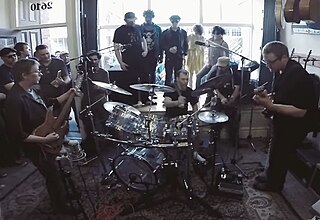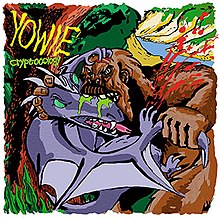
Siouxsie and the Banshees were a British rock band formed in London in 1976 by vocalist Siouxsie Sioux and bass guitarist Steven Severin. They have been widely influential, both over their contemporaries and with later acts. The Times called the group "one of the most audacious and uncompromising musical adventurers of the post-punk era".

Celebrity Skin is the third studio album by American alternative rock band Hole, released on September 8, 1998, in the United States on DGC Records and internationally on Geffen Records. It was the last album released by the band before their dissolution in 2002. Hole intended for the record to diverge significantly from their previous noise and grunge-influenced sound as featured on Pretty on the Inside (1991) and Live Through This (1994). The band hired producer Michael Beinhorn to record Celebrity Skin over a nine-month period that included sessions in Los Angeles, New York City, and London. It was the band's only studio release to feature bassist Melissa Auf der Maur. Drummer Patty Schemel played the demos for the album, but was replaced by session drummer Deen Castronovo at the suggestion of producer Beinhorn. This issue created a rift between Schemel and the band, resulting in her dropping out of the tour and parting ways with the group, though she received the drumming credit on the album.

The Creatures were an English band formed in 1981 by vocalist Siouxsie Sioux and drummer Budgie of the group Siouxsie and the Banshees. The Creatures released their first EP Wild Things in 1981. They recorded four studio albums: Feast in 1983, Boomerang in 1989, Anima Animus in 1999 and Hái! in 2003.

Mudvayne is an American heavy metal band formed in Peoria, Illinois in 1996. Known for their sonic experimentation, face and body paint, masks and uniforms, the band has sold over six million records worldwide, including nearly three million in the United States. The group consists of guitarist Greg Tribbett, drummer Matthew McDonough, lead vocalist Chad Gray, and bassist Ryan Martinie. The band became popular in the late-1990s Peoria, Illinois underground music scene, and found success with the single "Dig" from their debut album L.D. 50 (2000). After releasing four more albums and touring relentlessly for nearly a decade, Mudvayne went on hiatus in 2010. They reunited in 2021 and continue to perform live.

Melt-Banana is a Japanese noise rock band that is known for playing extremely fast noise rock and hardcore punk mixed with experimental, electronica and pop-based song structures. Since forming in 1992 the band has released ten albums and toured worldwide extensively.
Skin Graft Records is an independent record label specializing in no wave and noise rock, originally based in Chicago, Illinois. The label is largely responsible for spawning "now wave" genre, an updated version of the late 1970s/early 1980s no wave movement.
Dazzling Killmen was an American math rock band from the St. Louis, Missouri area. Formed in 1990, the group issued four singles and two full-lengths before officially ending in 1995, with a majority of it released through the independent label Skin Graft Records. Taking influence from hardcore punk and jazz music, the band has been noted by critics to have helped influence genres such as math rock and post-metal.

L.D. 50 is the debut studio album by American heavy metal band Mudvayne. Released on August 22, 2000, it is the band's first release on Epic Records, following the independently-released extended play Kill, I Oughtta. The album was co-produced by Garth Richardson and Mudvayne, and executive produced by Steve Richards and Slipknot member Shawn "Clown" Crahan.
Colossamite was an American math rock band based in Minneapolis, Minnesota. They were one of the most prominent exponents of the genre.

American Football is an American indie band from Urbana, Illinois, originally active from 1997 until 2000. They reformed in 2014.

U.S. Maple was an American noise rock band. The group formed in Chicago in 1995. The band consists of Al Johnson, Mark Shippy (guitarist), Pat Samson (drummer), and Todd Rittmann (guitarist).
AIDS Wolf was a Canadian noise rock band, founded in Montreal in 2003, by the graphic arts team of Chloe Lum and Yannick Desranleau, otherwise known as Seripop. They were joined by Myles Broscoe, Chris Taylor, Nick Kuepfer, André Guérette, and Alex Moskos. The band was known for playing modified consumer electronics and analog synthesizers, for giving creative names to instruments, and for being “weird for the sake of being weird.” On their label's band page, they stated "We are a fucking cult and will cause you harm and ill will," then added "The 9 Principles of AIDS Wolf".

"Candy Store Rock" is a song by English rock band Led Zeppelin, released in 1976 on their album Presence. It was also released as a single in the United States, but it did not chart.
Cheer-Accident is an American progressive rock ensemble headed by Thymme Jones. Jones took the name of the band from a Hallmark Cards shopping display, and first formed the group in 1981 with singer Jim Drummond and drummer Mike Greenlees.

Architects are a British metalcore band from Brighton, East Sussex, formed in 2004 by twin brothers Dan and Tom Searle. The band now consists of Dan Searle on drums, Sam Carter on vocals, Alex Dean on bass, and Adam Christianson on guitar. They have been signed to Epitaph Records since 2013.

Long Hair In Three Stages is the debut studio album by the Chicago-based experimental rock quartet U.S. Maple. After recording a debut single, they recorded the album in late 1995 at the Solid Sound Studios in Illinois with producer Jim O'Rourke. It was O'Rourke's first recording session with a rock band.
Nintendocore is a broadly defined style of music that most commonly fuses chiptune and video game music with hardcore punk and/or heavy metal. The genre is sometimes considered a direct subgenre of post-hardcore and a fusion genre between metalcore and chiptune. The genre originated in the early 2000s and peaked around the late 2000s with bands like Horse the Band, I Fight Dragons, Math the Band, An Albatross, The NESkimos and Minibosses pioneering the genre.

Motionless in White is an American metalcore band from Scranton, Pennsylvania. Formed in 2004, the band consists of lead vocalist Chris "Motionless" Cerulli, guitarists Ryan Sitkowski and Ricky "Horror" Olson, drummer Vinny Mauro and bassist Justin Morrow. Cerulli is the only member of the original line-up that remains in the band. The group has stated that their band name derived from the Eighteen Visions song "Motionless and White".

Yowie is an experimental rock band from St. Louis, Missouri, founded in 2000. The original lineup consisted of Jeremiah Wonsewitz on electric guitar, Jimbo "Moppy" or "Lil' Pumpkin" on electric guitar and Shawn "The Defenestrator" O'Connor on drums.
Space Streakings was a noise rock band from Japan formed in 1993 by four video game programmers. That year the band issued its debut album, Hatsukoi, through NUX Organization. The Space Streakings then signed with Skin Graft Records, whose attention had been piqued by the band's contribution to the Dead Tech 3: New Japanese Music compilation. In 1994, musician and music engineer Steve Albini flew to Japan in order to record the band's second album 7-Toku. Shortly after the album's release, Screaming Stomach, who had grown tired of the band's cacophonous sound, left the band. After a brief tour of the United States, which resulted in a collaboration with Mount Shasta of Chicago, Space Streakings disbanded.














